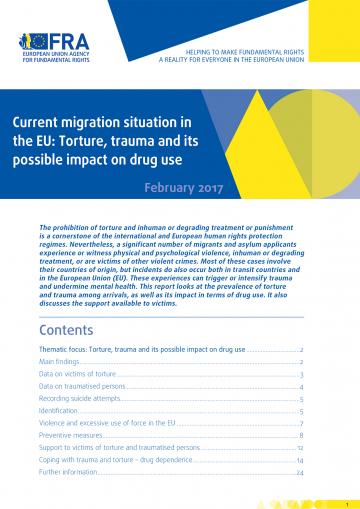The prohibition of torture and inhuman or degrading treatment or punishment is a cornerstone of the international and European human rights protection regimes. Nevertheless, a significant number of migrants and asylum applicants experience or witness physical and psychological violence, inhuman or degrading treatment, or are victims of other violent crimes. Most of these cases involve their countries of origin, but incidents do also occur both in transit countries and in the European Union (EU). These experiences can trigger or intensify trauma and undermine mental health.
This report covers:
Main findings
- Limited data are available on victims of torture among applicants for international protection, with Greece the only EU Member State to regularly collect this information. Similarly, data on traumatised applicants are sketchy and information on suicide attempts incomplete.
- Findings point to limited formal screening procedures to identify asylum seekers who are victims of torture or experienced severe trauma. Identification heavily relies on the expertise and knowledge of individual staff. Tools are increasingly being developed to facilitate identification by non-experts.
- In most EU Member States, there is no evidence that would suggest recurrent violence or excessive use of force by state officials or entities working on their behalf. Information collected by FRA mostly focuses on individual and localised incidents. At the same time, serious incidents are more frequently reported along the external borders of the Schengen area.
- Training, monitoring bodies and complaint mechanisms exist in all EU Member States, but their effectiveness in preventing ill-treatment varies from one Member State to another.
- A recurrent issue restraining victims’ access to support services is the limited number of specialised medical staff who can provide psychological or psychiatric support. The lack of staff often leads to long waiting periods. Starting therapy when asylum applicants are homeless or the conditions in a reception facility are not adequate to sustain the therapy poses another challenge.
- Limited information on the link between trauma and drug use has emerged. Drug use among asylum applicants particularly affects adolescents and young men, and has so far been given little attention.>
